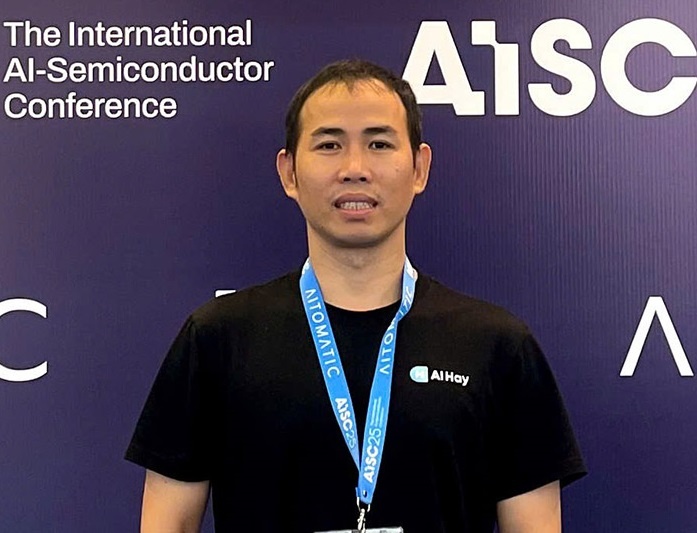Technology startups must deliver coherent value
Operating a startup has several challenges. What is the most memorable thing stuck during the company’s development journey?
In the 2023-2024 period, we faced difficulties in importing the DGX H100, renowned as one of the most powerful AI GPUs set at the time, which is in high demand among tech companies such as Tesla, Meta, and Microsoft.
 |
| Nguyen Tho Chuong, chief technology officer at AI Hay |
At the time, Vietnam was among the countries restricted from importing Nvidia’s most advanced chips due to a ban imposed by the US government. In November 2024, another measure from the Biden administration to further limit exports of advanced semiconductors and manufacturing machines to China came into force.
According to the US government, the new rules aim to eliminate ways to circumvent previous restrictions and will prevent, for example, the export of advanced AI chips to China.
In response to the announcement made in October 2024, the US Semiconductor Industry Association questioned the move, stating that overly broad, unilateral controls risk harming the US semiconductor ecosystem without advancing national security.
This posed a significant challenge for us. Startups already operate with fewer resources compared to foreign companies, and now they are unable to access cutting-edge hardware to develop their technology.
In 2023, AI Hay was one of the few companies in Vietnam to participate in the Nvidia Inception Programme. Is it an advantage to help the company access Nvidia’s technology?
In addition to the US government’s ban, Nvidia imposes several key criteria for companies wishing to participate in its activities. Notably, businesses must demonstrate that their product has a large user base-this proves that the startup’s technology has real growth potential.
Furthermore, the product must deliver clear value, which could be in education, economic growth, or applications that improve society. If the product is in the gaming sector, it must also demonstrate a positive impact. Another critical requirement is that servers must be hosted in legitimate locations
Nvidia mandates that hardware systems be placed in official data centres, such as those operated by reputable organisations or enterprises. This ensures the equipment isn’t used for purposes beyond the permitted scope.
These criteria mean that not every AI company can easily access the initiative. Even China has faced significant difficulties in importing similar equipment.
At that time, AI Hay had to find every possible way to navigate the situation. We reached out to contacts in Indonesia, the US, and partners in Vietnam, and even worked directly with Nvidia to prove that our product wasn’t tied to any restricted factors. Nvidia offers a special support programme, but even when accepted, companies still face hurdles due to US embargo policies.
Specifically, in 2023, we were one of the few companies in Vietnam to participate in the Nvidia Inception Programme. This allowed us to receive support to purchase hardware, but it came with extensive vetting processes.
We had to draft an entire document explaining how we would use the chips, emphasising that our AI product served education and labour productivity improvement, with no ties to sensitive fields.
How have the results been thus far?
Fortunately, during negotiations, the issue was partially resolved when FPT worked directly with Nvidia to bring chip shipments to Vietnam.
In May 2024, FPT imported Vietnam’s first DGX H100 server system after the signing of a memorandum of cooperation in April, marking the initiation of a strategic collaboration with Nvidia to advance AI development in the country.
But for small startups like AI Hay, the process remains far more challenging than it was for large corporations. After a period of negotiations, combined with FPT’s efforts to collaborate with Nvidia to import chips into Vietnam, we finally acquired a DGX H100 system – one of the most powerful AI systems at the time. This was a major milestone, as only a handful of much larger, wealthier companies could afford such a system back then.
Typically, in the US, companies can purchase chips within three months, but at that time, we had to wait 6-8 months to import them. It was an incredibly stressful period, and it felt like we were in a race with our legs tied.
Now, the programme has become more accessible, and young startups with support from universities or reputable organisations can also apply.
 | More startups wanted to aid innovation Changing policies related to innovation startup funds is expected to diversify the capital market for the startup business community. |
What the stars mean:
★ Poor ★ ★ Promising ★★★ Good ★★★★ Very good ★★★★★ Exceptional
Related Contents
Latest News
More News
- SK Innovation-led consortium wins $2.3 billion LNG project in Nghe An (February 25, 2026 | 07:56)
- THACO opens $70 million manufacturing complex in Danang (February 25, 2026 | 07:54)
- Phu Quoc International Airport expansion approved to meet rising demand (February 24, 2026 | 10:00)
- Bac Giang International Logistics Centre faces land clearance barrier (February 24, 2026 | 08:00)
- Bright prospects abound in European investment (February 19, 2026 | 20:27)
- Internal strengths attest to commitment to progress (February 19, 2026 | 20:13)
- Vietnam, New Zealand seek level-up in ties (February 19, 2026 | 18:06)
- Untapped potential in relations with Indonesia (February 19, 2026 | 17:56)
- German strengths match Vietnamese aspirations (February 19, 2026 | 17:40)
- Kim Long Motor and AOJ Suzhou enter strategic partnership (February 16, 2026 | 13:27)

 Tag:
Tag:




















 Mobile Version
Mobile Version